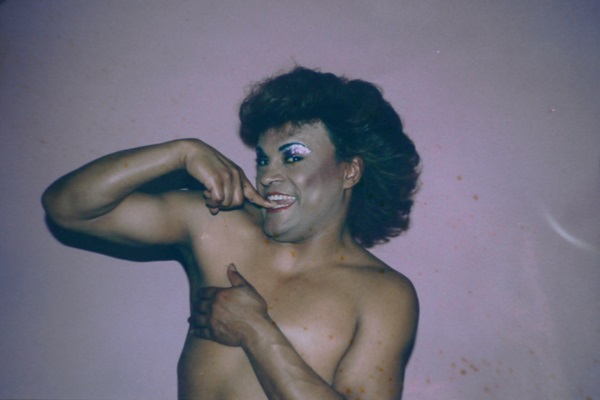Director Marie Losier follows The Ballad of Genesis and Lady Jaye with this engaging documentary, utilizing her personal style of shooting on 16mm, which gives her films a home-movie feel. Cassandro, an openly gay Mexican wrestler, wears his hair in a pompadour and enters the ring with long trailing tails on his vibrant, mostly purple outfit, all to his theme song, Gloria Gaynor’s “I Will Survive.” Cassandro has been competing in Lucha Libre for 26 years. Having suffered two heart attacks and dozens of injuries, his time left in the ring is ticking. If he doesn’t retire soon, he will be bound to a wheelchair for the rest of his days, but it’s hard to retire when his career has rewarded him so much more than anything else in life.
While one would expect much of the film to focus on the happenings inside the wrestling world, most of the film consists of Cassandro’s life outside the ring. We see Cassandro driving from where he lives in Juarez, Mexico, across the border to gigs in Texas, and spend time with him preparing for matches in his hotel rooms, as well as downtime in his home, where he proudly displays all of his scars and his Narcotics Anonymous chips. We are even treated to late-night Skype sessions between him and the director (the only scenes that aren’t shot on 16mm) in which he confides to his newfound friend all his doubts about giving up the sport that he loves.
Deeply spiritual, Cassandro is Catholic, and he also practices Native rituals and believes wrestling itself is a religion. Cassandro says that on Sundays, people in Juarez spend their mornings in church, with the rest of the day spent watching the second most popular sport in Mexico (after soccer), wrestling matches. No wonder it would be hard to leave that life behind: Cassandro’s role in the world of Lucha Libre is saintly, for becoming an idol for the LGBTQ community and educating fans, who might otherwise not know of a gay athlete in the sport.
Exóticos—the name for Cassandro’s brand of characters in wrestling—go back to the 1940s. Exóticos were characters coded as gay who would fight luchadores in the ring. They were always presented as comic reliefs and mostly performed by straight men (which is still the case for gay-coded characters in American pro-wrestling). In the 1980s, some exóticos started coming out, including Cassandro. Pioneers like him fought to be seen for their athletic abilities, to be taken seriously inside the ring as formidable contestants. Seeing Cassandro at work leaves no doubt that he can go toe-to-toe with any number of opponents, and his fame is well deserved. Often, Losier includes recordings of crowds chanting “Cassandro” over scenes of him preparing for a match. This subtle technique goes far to put us into his headspace, and we feel more the conflict facing him.
In a time when documentaries on streaming services have become so plentiful and so copycat–ish that the genre has even spun off into a parody cycle (see, Documentary Now!), watching a director play with the format is a welcome breath of fresh air.
Released by Film Movement
English and Spanish with English subtitles
France/USA/Mexico. 73 min. Not rated







Leave A Comment